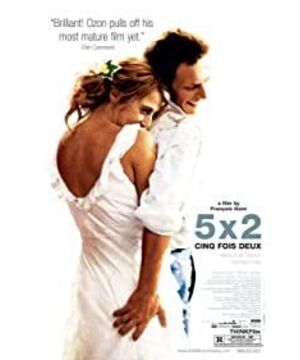In the evening, I watched the ending song of the third episode of the British drama Professional T. There was an Italian song "Una Lacrima Sul Viso" by Bobby Solo (with a teardrop on my face), and I found the original Ou Rong's "Love Appreciation Period" It was used in (5×2), and it turned out to be read eight years ago. The word "appreciation period" comes from Japanese. It does not refer to the shelf life, but the best tasting period. It is similar to the shelf life and is borrowed to refer to love. Be creative.
The story of "Love Appreciation Period" is actually not new. What makes it different is its narrative structure. It starts with a couple divorced, followed by family gatherings, then childbirth, then marriage, and ending with encounters. No, this is not called "Flashback", this is "reverse", most audiences misunderstood, "flashback" refers to the ending, climax or a certain segment at the beginning, and then narrated in chronological order, which is very common in film and literature, "reverse" "It is a narration of time from near to far, from the present to the past, reversing time, like rejuvenation, rare in literature and movies, similar to palindrome, the story "reverse narrative" and "sequential narrative" can be established .
Austrian writer Ilse Aichinger's short story "Story in a Mirror" (German: Spiegelgeschichte, English translated as Story in a Mirror), written in 1949, is included in the short story collection "The Bound." People"), which uses the "reverse narrative" technique to tell the story of a girl who died of an abortion operation and "woke up" again on the operating table. A loved one, a carefree childhood, until he forgets all languages and returns to infancy, and finally dies again in his mother's womb, alluding to the many upside-down phenomena in Western society, symbolizing a kind of power over linear time. Dismantling is also the dismantling of the patriarchal language order. Not sure if this is the first novel to use this technique.
In recent years, the mystery novel "13 67" published in 2014 by Hong Kong writer Chen Haoji also adopts the "reverse narrative" method. The changes in society seem to see the end of the era.
"Story in the Mirror" also uses second-person narration, which is also a relatively rare narrative technique. The mystery novel "Absolute Shout" published in 2014 by Japanese writer Ye Zhenzhongxian is a masterpiece of second-person narration.
The earliest film to use the "reverse narrative" structure was not "Love Appreciation Period" in 2004. Before that, there were "Irrevocable" in 2002, "Mints" in 1999, and then the British drama "Murder Retrospective" in 2017. Not sure "Mints" was the first.
Lu Xun said that "tragedy destroys the valuable things in life for others to see", but "reverse narration" just tries to put the destroyed things back together. However, it cannot reverse tragedy into comedy and let you see that the fragments of the vase are intact as before. The appearance of the time, but it can not change its broken ending, it will only be sadder than the tragedy.
The deceased is like a man, reluctant to give up day and night. A non-linear narrative about time, the original book of the movie "Arrival", Ted Jiang's "Story of Your Life", the time of aliens is different from the clockwise flow on Earth, our future is their past, so they Being able to "predict" our future, the heroine acquires the ability to "predict the future" by learning alien languages, but even if she knows the tragedy, she is willing to go. The readers think that what has happened is actually the future, but for the heroine It is something that is known at the moment. From the perspective of narrative technique, this is considered a "narrative trick" in terms of time, and this technique is not just a trick in the narrative structure, but is also inseparable from the content and theme of the story.
View more about Five Times Two reviews











